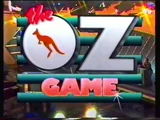| Host | |
| John Derum | |
| Announcer | |
| Alan Glover Anthony Ackroyd (sub-announcer) | |
| Broadcast | |
| ABC: 1988-1989 | |
| Packager | |
| Taffner Ramsay Productions | |
The Oz Game was a short-lived Australian-themed game show.
Gameplay
Three family teams (four on Friday) consisting of two members each (always with at least one kid or teen (this was the captain of the team)) competed in a quiz game where the questions were all about Australia.
The First Three Rounds
In each of the first three rounds, Derum asked jump-in questions. All the players were each given their own buzzer, so any of them could buzz in. The team that won a jump-in would score five points and get the advantage of the main question type of the round (except for the first one of the game, where both partners would each have to answer a question to get the advantage). Both partners could confer on the main questions, but only the captain could answer (and make the decisions, when necessary).
Round 1: Pass It On
The captain would be shown three items that have a common bond. He/she had to give another team a clue by reading them one of the items; thus, they would be "Passing it On." If the bond was guessed correctly here, that team scored ten points, if they were wrong, the controlling team could choose to guess the bond for ten points, or "Pass it On" to the remaining team. If they could correctly guess the bond here, they scored twenty points; if not, the controlling team would get to guess the bond and score twenty points themselves. If the bond wasn't guessed correctly here, everyone could buzz in and guess the bond. The round continued until time was called.
Round 2: Numbers Up
In this round the main questions had numerical answers. The captains would give their estimates, with the team who won the jump-in answering last (this was an advantage, giving them more time to think of an estimate). As for the other teams, the one with the lower score of the two would answer first followed by the team with the higher score. The team with the closest guess, high or low, would get ten points; in case of a tie, both teams got the points. Again, the round continued until time was called.
Round 3: Call My Bluff
In this round, Derum asked a question, the team that won the jump-in would choose a team to answer the question. The captain would give two possible answers and the partner gave a third one. Conferring was not allowed in this round; the captain had to answer the question immediately. A correct answer was worth ten points; if they were wrong, however, the bluffing team got the points by default.
Final Round: The Double Jump-In Round
This endgame is similar to the Fast Money round on Sale of the Century. But what makes it different is that in order to adapt it for two-member teams, each question had two parts. Both members of a team had to give both correct answers (one from each player) in order to score. A correct complete answer was worth ten points, but if either of them were wrong, ten points would be deducted from their score. Like in Sale, any questions that were answered incorrectly were went over after time expired.
The team with the highest score at the end of the game won a prize and earned the right to return for the Friday Finals, in which the winning team would also receive a holiday.
Losing contestants on Monday through Thursday received watches and windsheilders with the show's logo on them, and on Friday, they also took home a collection of books about Australia.
After twelve weeks, the weekly winners returned for the final week, where the winners would receive a bigger holiday.
Trivia
Announcer Alan Glover was absent for a brief period in 1989, during which time the announcing was undertaken by comedian Anthony Ackroyd.
